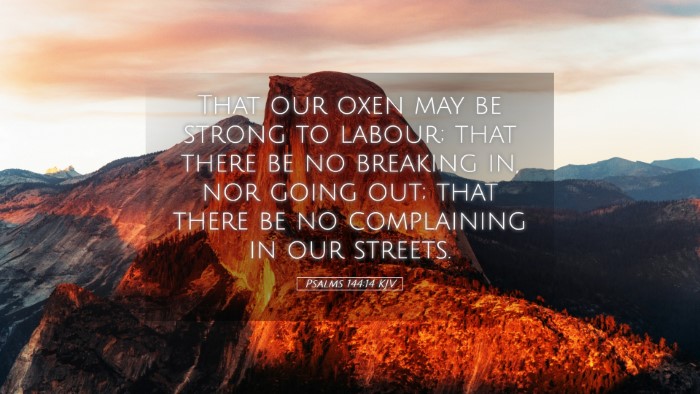Commentary on Psalm 144:14
Psalm 144:14 states:
"That our oxen may be strong to labor; that there be no breaking in, nor going out; that there be no complaining in our streets."
This verse is part of a royal psalm attributed to David, reflecting on the blessings of peace and prosperity in a well-governed society. It captures the essence of a prayer for divine favor, prosperity, and security. Below, we explore insights gleaned from various public domain commentaries to provide a meaningful understanding for pastors, students, theologians, and Bible scholars.
Overview of the Verse
The verse speaks about the strength of the oxen, which symbolizes readiness for labor and productivity in agrarian society. Furthermore, it highlights the importance of security within the community where social stability and harmony are desired.
Insight from Matthew Henry
Matthew Henry emphasizes that the strength of the oxen signifies the people engaged in labor. He remarks:
"The strength of the laboring class is essential for the thriving of the agricultural society. Without strong oxen, the work cannot be done, which leads to a breakdown in the livelihood of families."
Henry also points out that the absence of conflict and complaint in the streets indicates a society governed by peace. He reflects on the notion that:
"Where God blesses a nation, the people live in tranquility, free from fear of invasions and quarrels. Such peace enables the citizens to focus on their labor and community, fostering industry and fruitfulness."
Insights from Albert Barnes
Albert Barnes provides a more detailed interpretation regarding the elements presented in this verse. He notes:
"The strength of oxen symbolizes the abundance and the capacity for productivity. Oxen indicate a society that is prosperous enough to be engaged in agricultural activities and significant in labor."
Barnes elaborates on the phrase "that there be no breaking in, nor going out":
"This is a prayer for security. The psalmist desires that the gates of the city remain closed to enemies and that no one within the community should have to exit due to warfare or discord. It paints a picture of a safe, prosperous land, free from oppression."
Exegesis from Adam Clarke
Adam Clarke adds depth to the prayer's context with observations on social conditions:
"The plea for the strength of oxen to ensure labor is not only a request for physical strength but also a yearning for the collective wellbeing of the nation. If the laborers are strong, it infers a robust economy benefiting all."
Clarke further reflects on the social implications posed in the second part of the verse:
"The absence of complaints denotes a resilient society where citizens are content with their circumstances. It is an ideal state where grievances do not escalate into conflicts, fostering harmony among the people."
Theological Significance
Theologically, Psalm 144:14 can be viewed as a microcosm of God’s blessings manifested in a believer's life. It suggests:
- The Connective Divine Blessing: The strength of the oxen relates to God’s provision for physical and spiritual labor.
- Peace as a Divine Gift: The call for tranquility reveals the importance of spiritual peace in the life of God’s people.
- Community and Individual Responsibility: Each individual’s labor contributes to the overall health of society, echoing biblical principles of stewardship and cooperation.
Application for Today
The themes presented in this verse remain relevant today:
- Prayer for Community: It is essential to pray for peace, prosperity, and security within our communities. This calls for active involvement in social welfare.
- Encouragement for Labor: The commitment to diligent work is foundational for societal growth. Churches and leaders can inspire believers to engage in meaningful labor benefiting the larger community.
- Promoting Peace: Addressing grievances and fostering dialogue is crucial in maintaining peace in families, churches, and nations.
Conclusion
Psalm 144:14 serves as a prayerful reminder of the importance of strength in labor, societal stability, and divine blessing. The insights from Matthew Henry, Albert Barnes, and Adam Clarke provide a rich tapestry of understanding the social, spiritual, and practical implications of this verse. As pastors and scholars reflect on its meanings, it encourages the faithful to recognize that true prosperity involves collaborative labor, peace within communities, and reliance on God’s provision.


